SEO keyword research has become so competitive that long-tail keywords have got higher competition over time. Finding quick-win keywords that do not need backlinks is always a webmaster’s dream, whether he/she is a beginner, intermediate, or expert.

Keyword Golden Ratio, abbreviated as KGR, is a custom metric introduced by Doug Cunnington as a replacement for Keyword Difficulty, which back then was not a universal and not the most accurate way of calculating the actual difficulty of a keyword.
For instance, Semrush (review of Semrush.com) does not calculate the difficulty of keywords the way Mangools or Ahrefs do.
That is why finding low-competitive and quick-ranking keywords were always challenging, particularly for niche websites.
What is Keyword Golden Ratio?
Keyword Golden Ratio is a selection of keywords underused in Google search result pages. For instance, if one keyword phrase only appeared on the meta title ten times and its monthly search volume is 100, that means the Keyword Golden Ratio is 0.1 (10/100).
KGR = (# of allintitle search results in Google SERP)/(# of search volume)
Here is a video by Doug Cunnington introducing KGR and explaining his version of KGR keywords.
What is Allintitle?
Allintitle is a Google search operator that finds exact web pages on the Google index with the same keyword phrase in the title.

Here is another example.

In theory, the lower the number of Allintitle results, the better the chance for new content to rank easily and quickly higher on Google SERP.
If you conduct a quick Google search for competitive keywords for their Allintitles, you will figure out that those values are gaint. Therefore, unless you are a high authority site, it’s better off finding low Allintitle keywords for your content.
That is why Allintitle matters in finding the KGR of keywords.
Related: How to find and rank low competition keywords
The issues with the original KGR calculation method
Basically, the biggest pitfall of the original KGR calculation is that it’s valid (or more accurate) only if the search volume is below 250.
But, it becomes unreliable when you want to find the KGR of keywords with over 250 search volumes.
The other issue associated with KGR calculation is it does not really provide a great thought on the keyword’s value. For instance, in the original KGR, it’s recommended that using keywords with a KGR range of 0.0 – 0.25 will gives you more chance of ranking higher. But, it does not still guarantee that you will rank higher because it does not count on other variables such as competition, etc.,
How to Calculate Keyword Golden Ratio of Keywords in Bulk
Now you know what the KGR is and how to calculate it manually. As you might’ve already noticed, calculating keyword KGR for multiple keywords is a headache and troublesome.
What if you want to calculate the KGR of 1,000’s keywords? That is what I am going to cover in this section.
You will find numerous methods if you search online on how to calculate the golden ratio in keyword research. Some include fancy Google Sheets, Zapier, and other tools. But that is not what you want, right?
You want something easy to find KGR of keywords.
The tool I personally use (and recommend for any serious blogger) is WriterZen. It’s equipped with many tools like Keyword Research, Topic Research and Content Writer, and Plagiarism Checker.
But, the specialty of WriterZen is that it has improved the original KGR and has the system in place for you to make it easier to calculate the Golden Ratio of keywords in bulk in minutes. Check this complete WriterZen review and walkthrough to learn more about WriterZen’s Golden Score filter.
Meaning of WriterZen’s Golden Score
KGR = Allintitle / SearchVol x ClassRatio
Whereas:
ClassRatio Ratio Writerzen developed to classify value for 3 different keywords levelLevel 1: Top value keywords – Low allintitle competition & high search volume
Allintitle < 100 & Search Vol >100: KGR range 0 – 30Level 2: Medium value keywords – Low allintitle competition & low search volume
Allintitle < 100 & Search Vol < 100: KGR range 30 – 70Level 3: High competition keywords – High allintitle competition
WriterZen
Allintitle > 100
Features
- Find the Golden ratio of keywords with over 250 search volume
- Bulk calculate KGR without needing any extra tools for the procedure
- The calculation only takes far less time (usually under 15 minutes for over 1,000 keywords)

Bulk Calculate KGR
There are two ways to calculate the KGR.
- Find new keywords and calculate their KGR
- Calculate KGR scores for existing keywords
Keyword Research and KGR Calculation
First of all, sign up on WriterZen and head over to the Keyword Explorer section.

Enter your seed keyword. This could be any broad tail or medium-tail keyword. WriterZen also supports local keyword research, so this could be a fantastic option if you want to calculate the KGR for local SEO keywords.
As you’d see, WriterZen represents a lot of details about the keyword, including top ten SERP and its backlinks data, search volume, keyword difficulty, average CPC, search volume trend over time, total keywords, traffic, and top 1’s traffic share, etc.,
In the last part, in the Keyword Data section, you’d be represented with related keywords and their details.
Click on any related search phrase to see its SERP, search volume trend, and more.
The Keyword Golden Ratio of WriterZen starts with calculating the Allintitle. WriterZen will represent the Golden Score with Allintitle value. Click on the “Golden Filter” button.

Now you will be asked to confirm the calculation of KGR for all keywords. Click on the ‘Confirm’ button on the screenshot below.
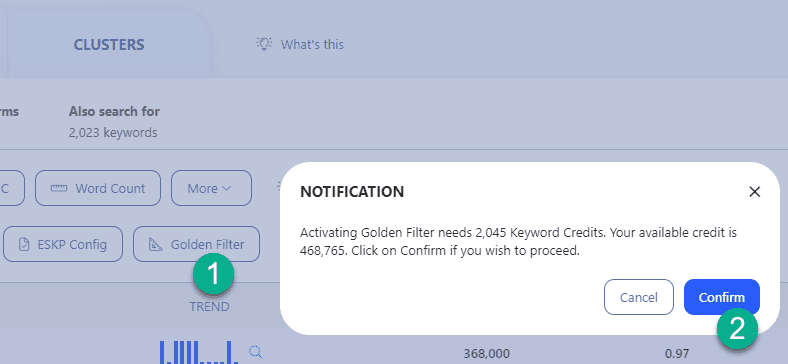
Next, at the bottom right corner, you will be shown a little notification box that displays the progress.

As you might notice, the KGR calculation time depends on how many keywords are. The higher the amount, the larger time it will take. But, do not be aware if it represents with longer time since normally it would take less than that.
It took less than five minutes to calculate the Keyword Golden Ratio for 2,000+ keywords in WriterZen. As you see, you will be shown both Allintitle and KGR scores.
Here are what you can do now:
Filter Keywords based on Golden Score
Click on the Golden Score button at the top and select a preferred tab.
- By Ranking Probability
- By Potential Value
By Ranking Probability
An excellent option if your website is new and no backlinks are built, and you want to find quick-win keywords that your site can rank on Google’s first page very quickly.

For example, if you want to find keywords with the probability of ranking on the first page, select 10. Also, selecting 1 will represent all the keywords with the probability of ranking in the first spot on Google.
By Potential Value
Not all keywords are equally valuable to your business. There are reasons why some keywords have got greater CPCs. This option in the WriterZen KGR score filter lets you find easy-to-rank keywords based on potential value.
Here are some KGR keywords with a good potential ranking value. See, all those keywords have a low Golden Score and allintitle score.
The plus side is that most of those keywords are quick-ranking SEO and high-value transactional keywords.

Just imagine how much time ⏲ it would take to find these manually!
How to calculate KGR in bulk [VIDEO]
Finding KGR for Existing Keywords
Suppose you already have a list of keywords that you want to find the KGR values. WriterZen lets you calculate Keyword Golden Ratios for those very easily.
First of all, head over to the Keyword Importer tool in WriterZen.

Click on the ‘Import Keyword‘ button, and you will be shown a popout box like the below screenshot.

Give a name for your project, and select the location and language of keywords. For example, selecting the United States will calculate the KGR for Google.com, and selecting the United Kingdom will calculate KGRs for Google.co.uk.
You can either copy and paste keywords (one keyword phrase per line) or import keywords from the file (.txt) or from a list you saved before on WriterZen.
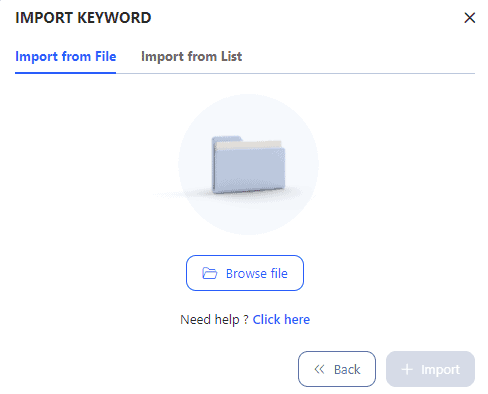
Currently, the maximum number of keywords you can import is capped at 3,000. Once done, click on the ‘+ Add’ button.
Like before clicking the Allintitle button, WriterZen will calculate both Allintitle and KGR.
Read: How to Unlock Not Provided Keywords in Google Analytics!
Check KGR by importing keywords [VIDEO]
Does Keyword Golden Ratio work?
I have been using WriterZen’s KGR metric for several blog posts on Pitiya, and the results are AMAZING!
Here is the evidence of Keyword Golden Ratio Keywords ranked at the #1 page of Google within days! 😳

Notice that the page did get its ranking over time. It started ranking on the first page of Google SERP once Googlebot indexed it. Also, the search volume for the keyword is 90 for the United States alone, which makes the keyword not bad.
Since you can get Google to index your content manually if you write quality content with KGR keywords included, you will have a greater chance of ranking it higher on SERP without backlinks or any Off-page SEO!
Some of my blog posts ranked on the first page on Google for targeted keywords literally in days, not weeks! 🎯
If you did not know how now you know! — Use KGR keywords with Writerzen!
Conclusion on Calculating Keyword Golden Ratio for Keywords in Bulk
Seeing what SEO has become over the years, it is no wonder that many bloggers find it challenging to rank the first page on Google for targeted keywords.
Keyword Golden Ratio or KGR simply selects underused keywords by finding Allintitles and measuring SERP content scarcity with various methods.
Doug Cunnington used a simple method that worked for keywords with under 250 search volumes. However, as SEOs and content marketers, you need to calculate the organic search traffic value for each click because nowadays, it’s sometimes better to focus on paid traffic over SEO traffic if organic traffic does not give you a higher ROI.
So, that is why the ‘Keyword Golden Ratio’ metric developed by WriterZen makes sense for any blogger. It reaches keywords that could not be taken in OG KGR.
You can calculate KGR manually. But, it does not get easier (and fun) when you have thousands of keywords. WriterZen makes it more convenient for anyone to compute KGR in minutes, not hours or days!
So, have you ever used KGR keywords on your content? What were your results?
Frequently Asked Questions on Keyword Golden Ratio
What is Allintitle in Google?
Allintitle is a search operator that filters search results that contain the exact word phrase on the title.
What is the KGR?
KGR stands for Keyword Golden Ratio. It is developed essentially to find underused keywords on search engine result pages.
What are golden keywords?
Golden keywords are highly valuable keywords in terms of return on investment with lower competition. You can find golden keywords by calculating their Golden ratios.
How do you get golden keywords?
You need to research keywords manually (time-consuming) or use a KGR tool (which takes investment). Learn how to get golden keywords in this tutorial.
How do I check Allintitle?

Visit Google and enter the allintitle:keyword phrase. See the screenshot below, for instance.
What is the KGR formula?
The original KGR formula is:
KGR = (Amount of Allintitle search results in SERPs)/(Number of search volume)
* SERPs = Search Engine Result Pages
How do you calculate KGR?
You can calculate the KGR manually by dividing the total amount of Allintitle results by the keyword search volume. Learn a quicker and more accurate way of doing it from this article.
Who invented KGR?
Doug Cunnington introduced Keyword Golden Ratio (KGR).

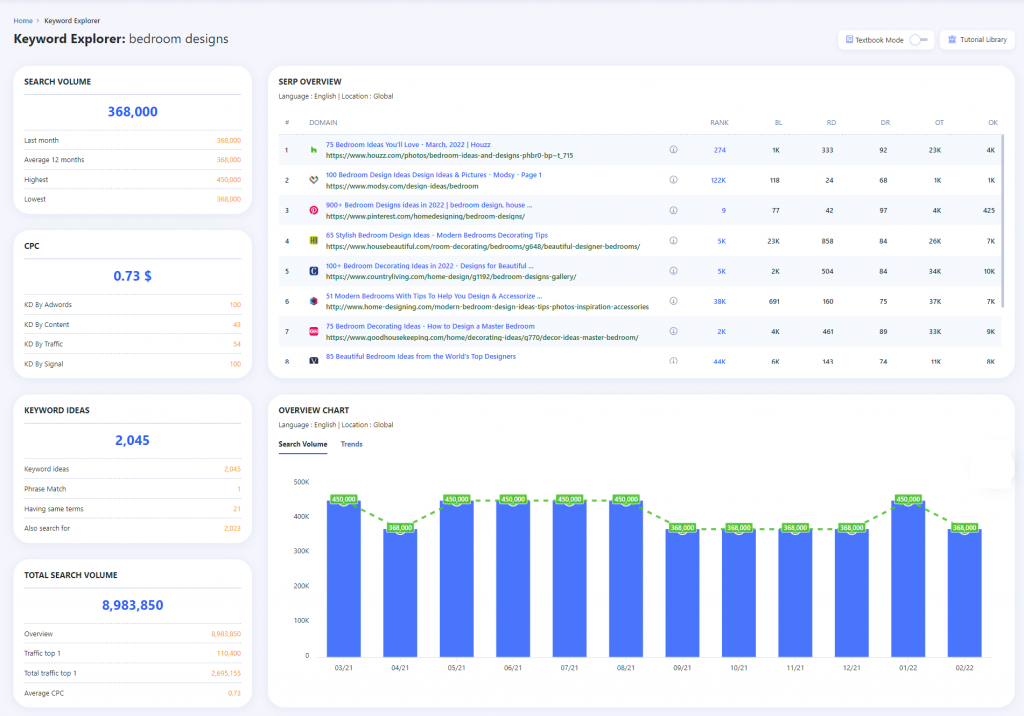

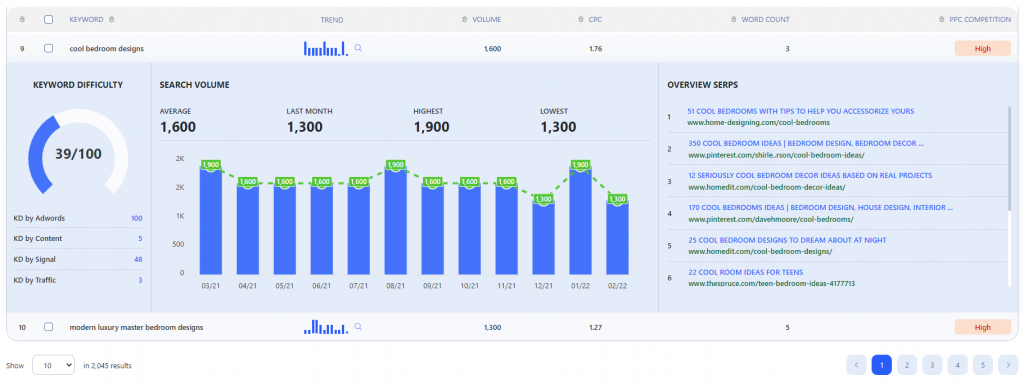


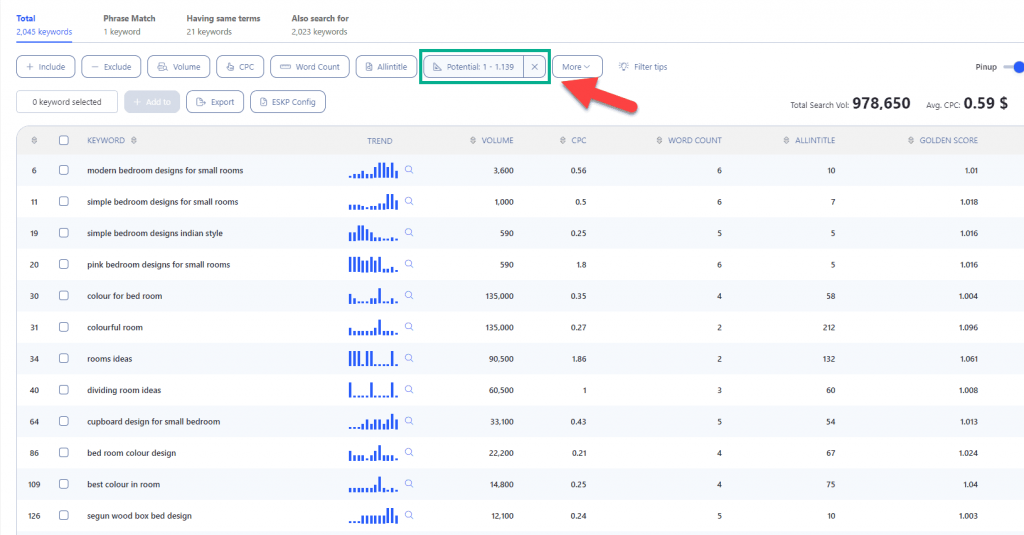

I think I’ll try this! Looks very promising. Thanks!